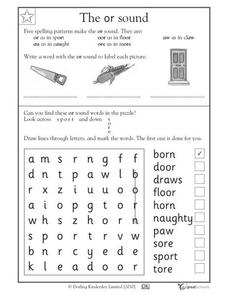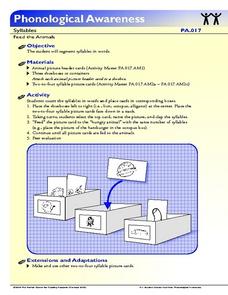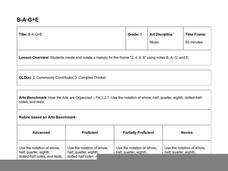Curated OER
Mystery Words
In this language arts lesson, 8th graders verify the meaning of a word in its context, even when its meaning is not directly stated. After a class discussion on how to use context clues, students pairs are given a worksheet of "mystery...
Curated OER
Performance-Based Assessment Practice Test (Grade 6 Math)
Keep track of your sixth graders' mastery of the Common Core math standards with this practice assessment. Taking a different approach than most standardized tests, this resource includes not only multiple choice questions, but also...
Curated OER
Transition Words in Expository Writing
Create to learn! Your class can create posters of transitional words and phrases to help them compose an explanatory text. They work in groups and focus on one type of transition (time, place, importance, etc.). They also create a poster...
Curated OER
Understanding and Using Root Words to Expand Vocabulary
Middle schoolers engage in a lesson which reminds them that root words indicate the base meaning of a word, and that those roots are found in many different words that have similar meanings. Pairs of pupils use construction paper and...
Curated OER
Babylonian Mathematics I
Learners examine a Babylonian clay tablet and the mathematics found on it as a catalyst to investigate a variety of mathematical ideas. They work with prime numbers, classify numbers as whole, integer, rational, or irrational and use...
Curated OER
The or Sound
Before using this vowel sounds crossword activity, be forewarned that the pronunciation here is based on British English, and will be confusing for American English speakers. Learners focus on the /or/ sound, examining five spelling...
Curated OER
Odd Ones Out
Some of these words don't rhyme; scholars determine which ones as they examine four sets of images with the vowel sound /e/. For each set, they circle the words that don't rhyme with the first image. Be sure kids know what these images...
Curated OER
Vowels and Consonants
Now that your scholars know the alphabet, make sure they understand that not all letters are the same! Explore the difference between vowels and consonants...not to mention that pesky y. Learners say the alphabet out loud and...
Curated OER
Connect the Rhymes
Pre-readers benefit from visual context clues like the ones in this rhyme learning exercise. There are two sets of objects here, and scholars connect objects on the left with their rhyming counterparts on the right. Each word has the...
Curated OER
Odd One Out
Which of these pictures doesn't belong? Based on the first picture in each row, learners circle the picture that doesn't rhyme with it. Then, they get printing practice with rhyming CVC words pie and cry by tracing an outline....
Curated OER
Water Cycle - A SiteMaker Presentation
Have your young scientists explore a single element of the water cycle and write a report to explain findings. Your class can take their writing through all the steps of the writing process and publish it using a Web-based multimedia...
Curated OER
Tell Us All: Tools for Integrating Math and Engineering
What a scam! Middle and high schoolers pose as journalists exposing consumer fraud. In this lesson, they write an article for a magazine using data collected during previous investigations (prior lessons) to defend their findings that a...
Curated OER
Animated Alphabet
Students explore English by completing an interactive language history activity. In this word recognition lesson plan, students discuss word formations and the phonetic relationship between letters. Students identify the origin of...
Curated OER
Find the Rhyme
Which one rhymes? There are four starting objects here, each heading a row of three objects. Learners identify the objects and their vowel sounds to determine which one rhymes with the first object. All these rhyming words involve the...
Curated OER
Find the Rhyme
Find the rhyming word. All of these rhyming, single-syllable words have the short i sound, but learners have to determine which ones they are. There are four starting objects each heading a row of three objects. They examine the...
Curated OER
Find the Rhyme
Which of these objects rhymes? There are four starter pictures here, each heading rows of three objects. Learners determine and circle the row object that rhymes with the first one. Then, they connect two of the CVC words with printing...
Curated OER
Odd One Out
Which word doesn't rhyme? As they practice vowel-sound recognition, scholars examine rows of familiar objects to determine which object doesn't rhyme. There are four rows here, each with a beginning image and three subsequent images....
Curated OER
Reading Bar Graphs #2
Raise the bar in your third grade class with this learning exercise on bar graphs. Youngsters view three graphs representing three different sets of data, and answer questions based on what they analyze. The first set is completed as an...
Florida Center for Reading Research
Dictionary Cube
Young scholars investigate new vocabulary words with a fun, collaborative activity. Given a deck of word cards, pairs of students flip over one at a time and independently look up the term in a dictionary. They then take turns rolling a...
Florida Center for Reading Research
Phonological Awareness: Syllables, Feed the Animals
An activity challenges scholars to sort picture cards based on the number of syllables they count as they say the item's name on each card. Depending on how many syllables they count, they place the card in the corresponding box...
Curated OER
How to Make Plurals of Words That End In "f" or "fe": A "F"able
Identify nouns that end in "f" or "fe." Review how to make words plural and the specific rules for words that end in "f" or "fe." Complete the fable activity sheet and find and write the plurals for words they find that end in "f" or...
Curated OER
The Final Word
Although this instructional activity is based on “Final Word,” Craig Wilson’s USA Today column, the strategies could be adapted to any local columnist. After reading three articles independently, groups share observations about content...
Hawaiʻi State Department of Education
B-A-G+E
Budding musicians discuss rhythmic notation and melody as they play a bar instrument or recorder. They use the notes B, A, G, and E to play a simple melody, and then they use those same four notes to turn a poem into a song. They...
Amateur Athletic Foundation
Olympic Lingo
Instead of bingo, why not play some Lingo? This vocabulary game is just like bingo, but it's all about words and focuses on building vocabulary. The resource provides a blank Lingo card, a filled-in sample, and a vocabulary list. All of...























